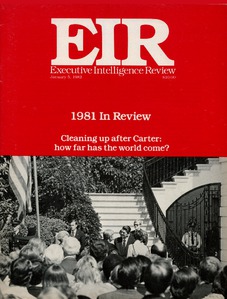Economics
Reaganomics, Volcker, and the Traps of 1981
by Richard Cohen
A blow-by-blow description of the “fiscal conservatism” setup against the President, and an assessment of why the Malthusians still consider him an obstacle to their zero-growth program.
Senate Sidesteps Fight with Fed
by Susan Kokinda
House Democrats in Divisive Bind
by Ronald Kokinda
Two retrospective analyses.
The Eurodollar Era Comes To an End: Banking Crises Out Of Control?
by David Goldman
David Goldman on the intended “third phase” after Bretton Woods and the rise of offshore lending.
How the Bank of England Plans To Exploit the Polish Debt Issue
by David Goldman
Documentation: An interview with U.S. Federal Reserve Governor Henry Wallich.
Special Report
What the World Needs To Survive in the 1980s
by Criton Zoakos
Editor-in-Chief Criton Zoakos comments on how the human species made it through 1981’s hazards, and on the moral fitness required beyond ad hoc responses to strategic dangers.
Depopulation Policy: Counteroffensive by Vatican, LaRouche
by Paul Gallagher
Against the policies and movements spawned so openly during 1981 by the Malthusian instigators of deliberate genocide.
U.S. Malthusians: Global 2000 Shifts Rhetorical Gears
by Lonnie Wolfe
The population slashers revised their marketing approach, and made notable gains in Washington, D.C.
The Year in Review
International
1981: The Year of the Global Assassins
by Linda de Hoyos
John Paul II Declares Political War on Enemies Within and Without the Church
by Vivian Zoakos
Socialist Mitterrand’s Victory Reverses Giscard’s Policy
by Philip Golub
Chancellor Schmidt Faces Threat to War-Avoidance Policy
by Michael Liebig
Post-Carter Challenge: The Future of Israel and Iran
by Robert Dreyfuss
The Soviet Leadership Question and the Trials of Leonid Brezhnev
by Rachel Douglas
Fresh start in U.S.-Mexico Relations as LaRouche Mounts a Policy Initiative
by Robyn Quijano
Central America: ‘Population Warfare’ Takes Bloody Toll At Behest of Haig, Socialist International
by Dennis Small
India Under Cloud of Pakistan War Danger
by Daniel Sneider
China: Deng’s Chickens Come Home To Roost
by Gregory F. Buhyoff
Tokyo Emerges from the Strategic Shadow of the United States
by Daniel Sneider
National
The legacy of Civiletti Still Hangs over Justice
by Warren J. Hamerman
The capabilities for terrorism, assassination, and frame-up of legislators and the executive branch were consolidated under Carter’s DOJ—and remain very much in place, while the “white-collar crime” crusaders let the narcotics cartel run loose, documents National Democratic Policy Committee Chairman Warren Hamerman.
Will Budget-Cutting Mania Make the U.S. Second-Rate in Science?
by Marsha Freeman
The damage inflicted in 1981 on advanced nuclear programs, the space effort, and associated R&D, is assessed by Marsha Freeman, along with resistance from Congress, scientific personnel, and Administration elements.
Failure To Revive U.S. Nuclear Power Means Crisis for Industrial Growth
by William Engdahl
Where we stand, despite Reagan’s pro-nuclear pledge, is appalling in terms of nuclear-energy capacity and the utilities’ situation overall.



